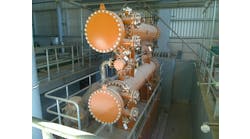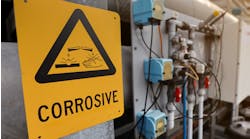The ability to take real-time performance data straight off the plant and seamlessly turn it into information for operators and maintenance staff is one of the main benefits of today’s asset management systems (see Plants focus on reliability, maintenance). Automating traditional condition-monitoring practices certainly could go a long way towards compensating for the growing skills shortage highlighted by many companies in that article. But can automation ever really replace the need for those skills?
“The impact of automation is rather counter-intuitive, in that the more automation you have the more maintenance you do — or rather, the more effective maintenance you do. Obviously, this will be more highly skilled maintenance and unless you have a really good training program for operators you will actually have less ‘predictive’ maintenance,” notes Torbjörn Idhammar of maintenance management consultant IDCON, Raleigh, N.C. Predictive in this sense, he explains, includes the plain old-fashioned routine of plant inspection — the “look, feel and smell” of equipment you get on plant walkabouts — as well as using the latest technology.
“It comes back to the fact that you have to do certain things well,” he says, “whether you call it asset management, TQM [total quality management], RCM [reliability centered maintenance] or whatever the latest buzzword is. When it comes down to being really better at maintenance, I would say 95 out of 100 plants are still not doing the basics really well.”
Those basics in his view include condition monitoring (with or without tools); preventive maintenance in the form of lubrication, correct alignment of machinery and so on; maintenance planning; scheduling work; and making sure the right spares are in stock. “And you need to have a good technical database,” he adds. “Those are six things that many people are still not doing — that’s why we’re in business!”
Now, while every plant undoubtedly appreciates the need for something as basic as the lubrication of rotating equipment, the level of appreciation has been a problem. This certainly is the impression given by Brian McNeill, product manager with Kaydon Custom Filtration, LaGrange, Ga., a firm specializing in designing and implementing oil filtration systems at petrochemical units, oil refineries and power plants. All these are leading-edge facilities, operated by blue-chip companies, yet McNeill says that until recently “rotating equipment, the turbines, were not very high on the list for proactive maintenance.”
The thinking, he says, was that if lube oil became contaminated, usually with water and particulates, plants simply would wheel in some type of portable oil filtration equipment (generally a centrifuge, which itself is “high maintenance,” notes McNeill), pipe it into the oil reservoir and run it until the oil was clean again — reactive maintenance of the simplest kind, best done during shutdowns or turnarounds, but running the risk of untreated contamination causing emergency unplanned downtime.
Kaydon’s approach is the proactive one of installing a dedicated oil filtration/coalescing system for each reservoir and running it 24/7, so the plant operators and maintenance staff don’t have to worry about contamination because it’s taken out of the system as soon as it occurs. “I think plants are starting to understand that this is a much better practice than having to move in equipment as a kind of Band-Aid,” notes McNeill.
Of course, installing such systems on a permanent basis can create some old-fashioned problems. “Sometimes you do get a battle on the plant between operations and maintenance as to who is responsible for the filtration system,” he says. “The more you can remotely monitor and instrument the system, the more it becomes part of operations.”
But then that really is one of the goals of today’s asset management systems — giving plant operators a better insight and appreciation of how their actions can impact on the performance and reliability of equipment.
“Fifteen years ago plants didn’t have anyone called a ‘reliability engineer.’ The guys that dealt with the oil were known as the ‘oilers’,” says McNeill. Well, whatever they’re called now, they need to be appreciated more than ever before.

